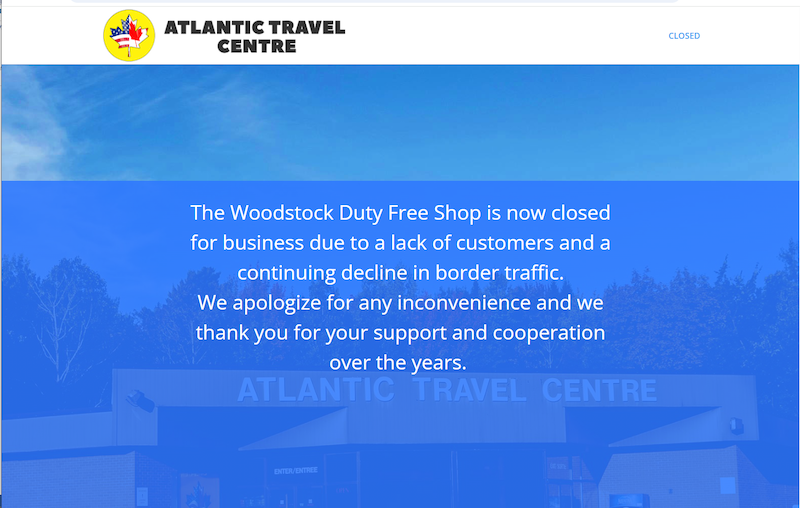The tariffs are having a devastating impact on Canadian duty free, as fewer Canadians are traveling south in response to U.S. President Donald Trump’s trade war with Canada. One Canadian land border store has already shut its doors because of the lower traffic and sales, and many others fear they will follow, FDFA Executive Director Barbara Barrett tells TMI.
“It was truly pandemic level traffic over the summer. John Slipp’s Woodstock Duty Free in New Brunswick closed in August. The more remote the store, the more difficult it is for them. John’s store is in the east, and some in the west are in the same situation, worried about having to close,” says Barrett.
“We did a survey before the summer, and a third of our members said that if they didn’t have a good summer that they may be looking at closing.”
Sales are down across the country anywhere from 50-60%, says Barrett.
“In the more remote areas, sales can be down from as much as 80%. Ontario and some of the more central stores are doing better, down by 30-50%. Those are still big numbers, no matter how you look at it,” she says.
The cross-border traffic numbers are as bad as the sales. Road trips to the U.S. decreased for a seventh straight month in July as Canadians continued their American boycott. Canadian-resident return trips by automobile from the U.S. fell 36.9% in July versus a year ago, according to Statistics Canada data.
“Statistics Canada has been reporting a steady decline every month. Canadians have been quite vocal saying they’re not traveling to the U.S. and won’t be for some time.”
Barrett and the FDFA are strongly advocating for help from the Canadian Federal Government to make sure that more land border stores don’t have to close.
“We are in constant dialog with both the Prime Minister’s Office and the Minister of Finance’s office. So they’re well aware of our situation. The Prime Minister just announced a $5 billion fund for small- and medium-sized businesses most affected by tariffs, and we are working with finance to ensure that we qualify for some portion of those loans. It looks like we will qualify for some liquidity, which will be helpful in the short term for our stores.”
In the longer term, the FDFA is advocating for small regulatory changes that Barrett says would “allow us to have a more level playing field with the U.S.”
The FDFA says that there is still a misunderstanding of how land border duty free works throughout government departments.
“There’s an erosion of the understanding that we are an export industry. As a result, some domestic policies and domestic taxes have been applied that should not be put on us. We’re asking for a directive from the Minister of Finance to all departments to clarify that we are, in fact, export.”
The FDFA is also asking for the removal of an excise tax on tobacco sold in duty free.
“This is an excise tax that our American counterparts don’t have. We’re asking the government to level the playing field and align that excise tax on tobacco products for us.”

Tariff threats halt post-pandemic recovery
Before the tariff threats, Canada’s land border duty free stores were on the road to recovery from Covid-19’s impact on travel, says Barrett.
“Most stores were starting to approach 2019 levels of traffic and sales. As soon as the tariff threats and rhetoric came, traffic and sales fell off a cliff,” she says.
But Barrett is sure that the latest crisis is just temporary, and traffic and sales will return.
“It’s really hard to have optimism at this time. But what we’re sure of, because we’ve been through a crisis before, is that this is a moment in time and then business and traffic will come back.
“These are viable businesses that have been part of the Canadian tourism fabric for over 40 years. These are family-run businesses that are very integral parts of small communities across Canada. We can’t lose them.
“Our land border between Canada and the U.S. is very special. We’ve enjoyed that flow of traffic back and forth for decades, and border communities on both sides really are dependent upon that flow. So it will come back.
“We just have to get through this moment in time, and we need some support getting through it. And then we will thrive again.”
.
Scaled down 2025 FDFA Convention
Due to the ongoing challenges facing the duty free industry in Canada, the FDFA made the decision to scale down its traditional convention into a more focused and intimate format.
“We had to take a measured approach. We had to see the status of the stores, where our suppliers were, and the best way to move forward. We are holding an event. We’re not calling it a convention. It will be smaller and more focused, and we plan on coming back in full force again after we get through this moment in time,” says Barrett.










